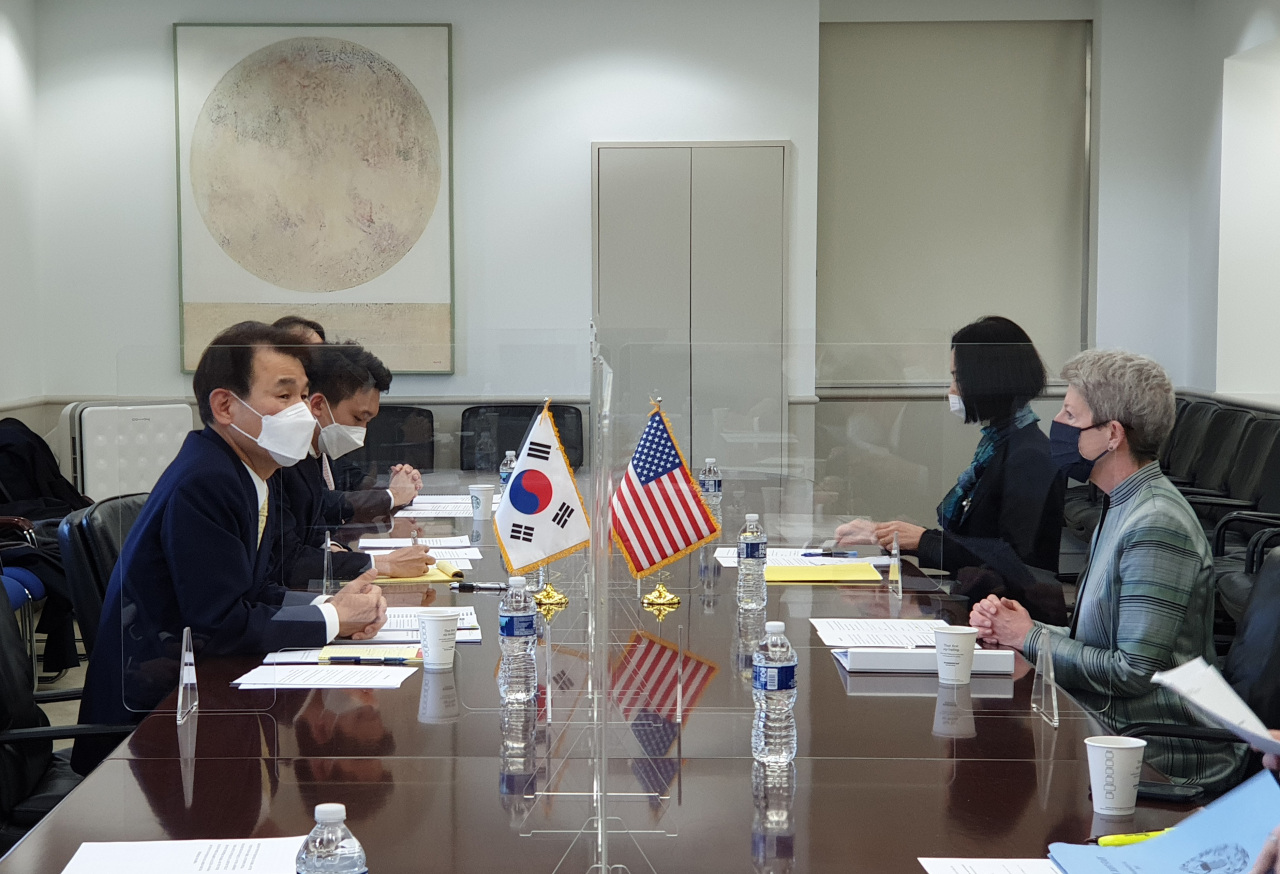
South Korea and the US have reached an agreement on how much Seoul should shoulder for hosting US troops here, both countries announced Monday, ending years of standoff over the thorny issue.
A major breakthrough to the talks on renewing the Special Measures Agreement, the pact that governs the upkeep of US Forces Korea, came amid three days of face-to-face meetings on Sunday in Washington, led by Jeong Eun-bo, Seoul’s chief negotiator, and his US counterpart, Donna Welton.
South Korea’s Foreign Ministry on Monday said the two sides “reached an agreement in principle.” It added both sides will make a public announcement and hold a tentative signing ceremony after completing internal reporting procedures.
The ministry, however, did not provide any other details.
The State Department also announced that the two sides “reached consensus on a proposed test of a Special Measures Agreement that will strengthen our Alliance and our shared defense.” It also added the proposed agreement contained “a negotiated meaningful increase” in payments by South Korea, but the exact terms weren’t disclosed.
The drawn-out negotiations toward the renewal of the SMA put a strain on the long-standing alliance during the Trump administration, which had demanded from its Asian ally a hefty hike in its contribution. Despite multiple rounds of talks since September 2019, the two sides failed to clinch a deal, largely due to differences over the amount that Seoul should shoulder.
The previous one-year accord expired at the end of 2019.
Last year the two sides were close to signing a new deal when Seoul offered to pay 13 percent more from the previous accord, when it paid 1.04 trillion won ($919.1 million), but Trump turned down the offer and reportedly demanded a 50 percent increase.
The exact figures of the deal remain unknown, but the Wall Street Journal reported that the new SMA would be a multiyear deal that would last through 2025.
Observers also view the increased rate would be no bigger than Seoul’s initial proposal of 13 percent.
“I believe the agreed amount would not be above 13 percent rise, and it can be a little less than that rate,” said Park Won-gon, a professor of North Korean studies at Ewha Womans University, adding another core issue is whether the two sides agreed on the rate of increase each year.
“During the Obama administration, the agreement was that the annual increase rate was not to exceed 4 percent, considering inflation,” said Park. “A rate similar to this or less would seem likely.”
The agreement now awaits several steps for it to be concluded, including a tentative signing of the deal, a review by the Ministry of Government Legislation, approval from a Cabinet meeting and then by President Moon Jae-in before the two countries officially sign it. Finally, the National Assembly here has to ratify the SMA, as the last step, while the US does not require congressional approval.
With the two countries keen on resolving outstanding bilateral issues in an effort to deal with other challenges in the region, specifically North Korea, the process is likely to speed up.
As US Secretary of State Antony Blinken and Defense Secretary Lloyd Austin reportedly plan to visit South Korea next week, many observers view the signing ceremony could happen during this time, as a move signaling a strengthened alliance between the two countries.
“The defense cost agreement is a sign of reinvigorated ties between Washington and Seoul,” said Park.
It is also part of US President Joe Biden’s alliance-centric policy of improving relationships with traditional allies to tackle various challenges, including a nuclear-armed North Korea and to keep an assertive China in check.
Before the election, Biden has vowed not to use US troop presence to “extort” Seoul, and to strengthen the alliance to safeguard peace in the region and beyond.
By Ahn Sung-mi (sahn@heraldcorp.com)








![[KH Explains] Hyundai's full hybrid edge to pay off amid slow transition to pure EVs](http://res.heraldm.com/phpwas/restmb_idxmake.php?idx=644&simg=/content/image/2024/04/18/20240418050645_0.jpg&u=20240419100350)







![[From the Scene] Monks, Buddhists hail return of remains of Buddhas](http://res.heraldm.com/phpwas/restmb_idxmake.php?idx=652&simg=/content/image/2024/04/19/20240419050617_0.jpg&u=20240419175937)

![[KH Explains] Hyundai's full hybrid edge to pay off amid slow transition to pure EVs](http://res.heraldm.com/phpwas/restmb_idxmake.php?idx=652&simg=/content/image/2024/04/18/20240418050645_0.jpg&u=20240419100350)

![[Today’s K-pop] Illit drops debut single remix](http://res.heraldm.com/phpwas/restmb_idxmake.php?idx=642&simg=/content/image/2024/04/19/20240419050612_0.jpg&u=)